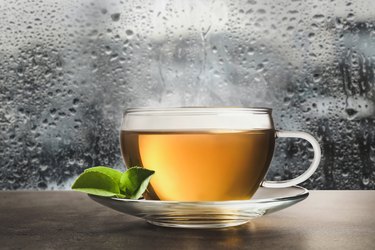
Steeped tea, hot or cold, is more likely to be associated with health benefits than with gastrointestinal discomfort. So, if you experience bloating after drinking tea, it's unlikely that the tea itself is the culprit. Think, instead, about what you've added to it.
Read more: The 9 Worst Foods for Bloating
Video of the Day
Video of the Day
Tea, Plus What?
"Tea and bloating are a random correlation; I never would put the two together," says Ashli Greenwald, RDN, LDN, a registered dietitian at Johns Hopkins Bayview Medical Center in Baltimore.
However, the addition of milk to tea could be problematic for people who have a lactose intolerance, which is caused by a deficiency of the enzyme lactase. Lactose intolerance can cause symptoms of gas, bloating and diarrhea, according to the Mayo Clinic. While these symptoms may be uncomfortable, they're generally considered harmless.
Sweeteners are another possible culprit, though probably not that likely, Greenwald says. "The artificial sweeteners most commonly associated with cramping, bloating and diarrhea — sorbitol and manitol — are generally used in sugar-free candies and other products," she says, "but the artificial sweeteners people add to beverages, like aspartame or sucralose, really don't cause bloating."
Tea 101
Tea is among the most commonly consumed beverages globally, second only to water. Traditional tea is a preparation of hot water poured over the cured leaves of the Camellia sinensis plant. The flavoring of tea — black, oolong, green or white — depends on where it is grown and how it is processed, according to the Harvard T.H. Chan School of Public Health.
Herbal teas are not true teas, but derive from herbs, fruits, spices, roots and leaves other than Camellia sinensis leaves, the Harvard School notes.
What Tea Can Do for You
Some studies have found tea consumption, two to three cups a day, associated with a lessened risk of type 2 diabetes, stroke, heart disease and early death, the Harvard School notes. But, because studies on humans and tea are sparse, more data is needed on these and other possible cancer-fighting benefits.
Traditional teas — black, oolong, green and white — are rich in polyphenols; specifically flavinols, theraflavins and catechins. "These polyphenols act like anti-oxidants, which can help prevent the damaging effect of free radicals on the body," Greenwald says.
Free radicals are molecules that latch onto DNA electrons, altering the DNA and negatively impacting cell health, the Harvard School adds. Though green tea is reputed to be higher in antioxidants than black and oolong teas, all traditional teas contain about the same level; it's their proportions that differ by color, with green teas being higher in catechins and black tea boasting the highest proportion of theaflavins.
Some herbal teas contain beneficial polyphenols as well, though the type of polyphenol will vary according to what the herbal tea is made from. Of note, the addition of dairy (milk or cream) to any tea may diminish the antioxidant effect of that tea.
Tea consumption also has been associated with stomach and esophageal cancers, possibly from drinking it too hot, based on a meta-analysis of 16 studies outside the United States, notes the Harvard School. However, these associations need to be confirmed in more rigorous studies.
Herbal Teas and GI Comfort
Contrary to causing bloating, some herbal teas are associated with having a calming effect on the stomach, Greenwald says.
"There has been a lot of research on peppermint tea showing that it can soothe an upset stomach," she says. (One caveat: peppermint can trigger heartburn if you're someone who has acid reflux, per Johns Hopkins Medicine.
"Ginger, too, has been shown to help with nausea, cramping, gas and indigestion," Greenwald adds. "Chamomile tea, often thought of as a before-bed beverage, may also settle your stomach and can help with sleep."
For people who struggle with constipation, Greenwald will recommend a senna-based tea, like Smooth Move. "Senna is a natural laxative," she says. "It can cause some cramping and gas as it stimulates the GI tract, but those symptoms will resolve along with the constipation."
A couple of things to keep in mind: Traditional teas contain caffeine, which can hinder sleep and cause jitteriness, and tannins that may affect iron absorption. "I counsel patients with anemia to be mindful about consuming things with tannins, including tea," Greenwald says.
Read more: 6 Teas to Stock Up On and Their Health Benefits
Was this article helpful?
150 Characters Max
0/150
Thank you for sharing!
Thank you for your feedback!
Is this an emergency? If you are experiencing serious medical symptoms, please see the National Library of Medicine’s list of signs you need emergency medical attention or call 911.